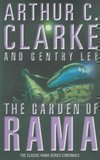
Like Rama #2, I went back and forth while reading this one on if I was actually enjoying it or if I would finish it at all. In the end, I did finish it and I think I’ll even start the last one mostly out of a sense of completionism.
Essentially, there are five sections:
In the first, the three explorers from Rama II are leaving the solar system at high speeds. The parts where they are exploring the ship and learning how to live with the local 3D printer and interacting with other alien species is neat. The part where they decide that two men and a woman are enough to start a colony… That’s just a little weird. I missed the first book, where the science and sense of exploration was the core of the story.
In the second, they get to a sort of routing section and finally meet an alien intelligence (even if it’s still a robot). They (and by extension, we) get some neat answers. I liked this section for precisely the same reason I didn’t like the first section: it’s about exploring the world of Rama.
In the third, they go back to Earth, both in the context of the story and for a few scenes. They are all new characters and I cannot figure out why I care about any of them. Then they’re sent off to a colony on Mars, except… surprise, they’re actually going to make a new colony on the rebuilt Rama II. This is fine, but I feel like it could have been shortened.
In the fourth, the colony grows and thrives. Or not. Turns out people are people and people are terrible. Really, this whole section was depressing and not really what I was hoping to see in this book. I liked the smaller scales of the first 2.5 books. This not so much. Especially since it all ends up with exactly the sort of power struggle and corruption that I both see as entirely too plausible and hope isn’t actually inevitable in such situations.
Finally, there’s a big jump in the last ten percent or so where Robert goes to meet with the avian colony from the previous books. Suffice it to say, they have a strange lifecycle that we’d previously , which would have been much more interesting had Orson Scott Card not done it ~4 years earlier in Speaker for the Dead. It is exactly the sort of thing I wanted though, I just wish it had more relation to the rest of the story and had more than 10% of the pages. This is why I’m reading the 4th book, hoping there will be more of this.